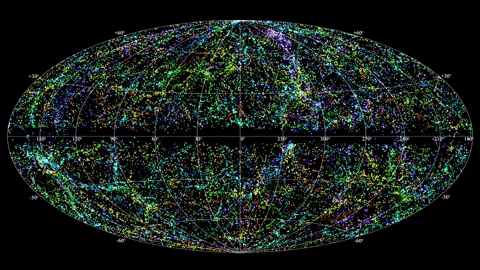What attracts me immediately about the book is the focus on exchange between domains that are usually separated: literature, science, and philosophy. Of course, you can throw economics, religion, and most any other domain into the mix, and Serres seems to do so whenever it suits his purposes. By its nature, exchange opens any domain to other domains. Moreover, regular and systematic exchange within a domain is a large part of what defines that domain. That's the nature of exchange: the pathway by which entities move energy, matter, information, and organization among or within themselves. Or perhaps a better way to say it is that exchange is the way that entities facilitate the flows of energy, matter, information, and organization. And don't think of flows as laminar and unidirectional. Nature provides for plenty of backwash, misdirection, redirection, and resistance. Flow is not simple.
The Greek god Hermes is the dominant agent standing at the crossroads, gateway, or bridge of the points of connection across which exchanges are made. Hermes is the god of exchange. Whenever two atoms exchange electrons, there is Hermes. Whenever two Instagram users swap memes, there is Hermes. Whenever people share bread, there is Hermes. Uhhh .. and Jesus, who has clear hermetic properties. Connectivity means exchange, and networks and rhizomes are mapped by their exchanges, their points of connection across which things flow, back and forth. Hermes, then, is the God of Emergence, presiding at all the points of connection and exchange which enable the emergence of entities, from ions through societies to galaxies. Hermes is one busy dude. I suspect he is worthy of serious consideration.
The second attraction for me is how Serres explores the connections and exchanges between the humanities and the sciences. As the editors of this volume explain it:
There exists a passage (or passages) between the exact sciences on the one hand and the sciences of man on the other. This thesis in itself is not new. Since the pre-Socratics and Plato, there have always been attempts to link these two domains, to overcome an unfruitful division. (Harari and Bell xi)It seems to me that the principle of exchange runs through all domains and through all our systems for modeling and expressing our knowledge of those domains: natural language, number, music, image, statues, scale models both real and computer, and so forth. And exchange scales. This blog post, for instance, is composed of letters which exchange data to combine and form words, which exchange data to form sentences, which exchange data to form paragraphs, to form posts, to form a blog, to form a blogosphere, to form ... well, you get the idea. Numbers do the same, exchanging information and organization to enable the emergence of new entities at multiple scales. Bodies do the same: particles to atoms to molecules to cells to organs to me to family to community to ... well. Understanding any domain through words corresponds to understanding any domain through numbers. Words and numbers are not the same. Each has its own strengths and abilities, but they each use exchange and connectivity to combine and recombine in ways that generate and move information and organization and that describe matter, energy, information, and organization. We can do words about words, numbers about numbers, and words about numbers and numbers about words.
 |
| Image: © NRAO Outreach/T. Jarrett (IPAC/Caltech); B. Saxton, NRAO/AUI/NSF |
Fortunately, Serres is well trained in sciences, literature, and philosophy, and he is fun to follow. And that's what I'll do for awhile. I want to see where Hermes leads us.
No comments:
Post a Comment